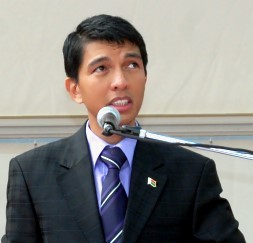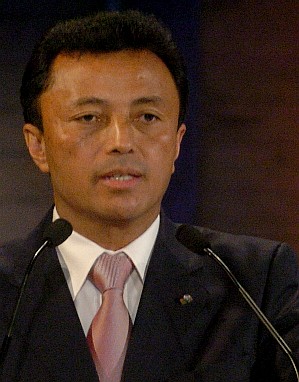|
Madagascar Politics Military threat sparks Madagascar dialogue
On Monday, the Malagasy army leadership presented self-imposed President Rajoelina with an ultimatum. He was given 48 hours to present a roadmap out of the political crisis that has shaken the Great Island during the last 13 months, or face unspecified consequences.
As the AU and SADC, after imposing sanctions, now are holding a low profile regarding Madagascar, local reports indicate the Brussels-based think-tank International Crisis Group (ICG) is now taking an active mediation role. An ICG mediator is reported to be in Antananarivo, holding meetings with Mr Rajoelina's administration. The ICG in a March analysis proposed to give up the AU's idea of a power-sharing deal, which was not being implemented by President Rajoelina and which could have led to further political instability due to the strong personal conflicts between the Malagasy strongmen. Rather, mediation should "aim for consensual writing of a constitution and early, internationally supervised elections," the ICG concluded. The invitation of an ICG representative to Antananarivo could indicate that Mr Rajoelina may opt for this early election possibility in his roadmap to the Malagasy crisis. The threat of military intervention has also led to movements on the anti-Rajoelina side in the conflict. Ex-President Ravalomanana has temporarily stopped his media campaign against the current ruler, cancelling a Tuesday press conference, and political activists supporting him in Madagascar have cancelled all protest action. Mr Ravalomanana's party seeks calm to engage in renewed dialogue and to show support for the army's intervention. Meanwhile, President Rajoelina has announced he will make a speech and "engage in debate with the press" this evening, outlining his thoughts about how Madagascar's political crisis can be solved. Internationally, for once, there have been no official reactions to the Malagasy army's threats. The AU, which normally is firm in its condemnation of military interference, has made no statement on the matter. By staff writers © afrol News - Create an e-mail alert for Madagascar news - Create an e-mail alert for Politics news
On the Afrol News front page now
|
front page
| news
| countries
| archive
| currencies
| news alerts login
| about afrol News
| contact
| advertise
| español
©
afrol News.
Reproducing or buying afrol News' articles.
You can contact us at mail@afrol.com









